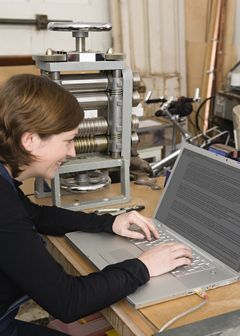Finding a Qualified Resume Writer for a...
|
| Resume Writers... | Thumbnail Review... |
|
www.resumewriters.com | Reasonable pricing, standout writing, and an interview guarantee from the largest network of resume writers on the Internet (representing more than 5 dozen career fields and industries). Guaranteed interviews within 60 days. The BBB gives them an A+ rating. |
Considering a Career Move into Machine Tools Operations?
If you're considering a move into machine tool operations from either a closely related field or from a totally unrelated profession, you'll be looking for a transitional resume -- and a talented resume writer to handle the assignment. Transitional resumes are some of the most difficult resume projects as they require a writer knowledgeable in at least two professions -- and the ability to identify transferable skills from one to the other.
Before you hand off that resume assignment, make sure you know enough about the job of a machinist to... a) really want it, and b) be able to step up to the plate. Here's a quick overview (more information at Wikipedia - Machinist):
 |
What You'll Do: Most machine workers today are labeled as CNC
machinists because today's milling machines, grinders, lathes, and more are computer numerically
controlled. This means that a machine will do all the dirty work after you program specific
instructions into it. In this sense, the job of a CNC machinist is more computer programmer than
manual labor. However, manual machining work is sometimes required as well. You'll probably work regular, full-time hours in a production factory alongside many other machinists, but overtime work is not uncommon. Although some on-the-job training is generally provided by the employer, rates of injury are still relatively high since you will be around industrial machines that are loud, heavy, and dangerous if used improperly. You will be required to wear protective equipment such as safety goggles, a helmet, gloves, and steel-toed boots while on the job. |
 |
Education and Training: Most machinists are not required to possess a college degree, although other forms of training are usually mandatory. The most common educational path is attending a community college, technical school, or vocational school for a program leading to a certificate or associate's degree, although many prefer a formal apprenticeship to study under a long-time professional. Those with engineering degrees may find it much easier to land a job, and some get certified by certain agencies to get an advantage over the competition. Any real-world machining experience also looks good on a resume, and being adept at math and computer usage is another huge plus. |
 |
The Future: The machine tool profession is expected to grow at about 7% through 2020. That's slower than the average for all occupations--so expect competition to be keen. |
 |
The Pay: Average pay for Machinists in the U.S. range from $11.50 to $27.90 per hour, with the average wage hitting $18.86 in 2011 (about $39,200 annually) as per the U.S. Bureau of Labor Statistics. |
Still interested in pursuing a position in machine tool operations? Great. The next step is to prepare for a consultative telephone interview with your resume writer. Treat the coming job search like the business it is, and you'll do fine.
Best of luck,
David Alan Carter, OccupationalResumes.com

Tag or bookmark under:
Machinist Resume | Machinist Occupation | Resume Writing Services for Machinists
_____
NOTE: This website
is monetized through the use of Affiliate Programs with the online providers we review. Read our Disclosure Statement for more information on our Affiliate
Relationships.
|


 Back To
Top
Back To
Top Facebook
Facebook Twitter
Twitter